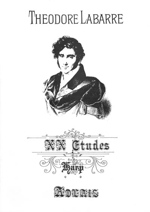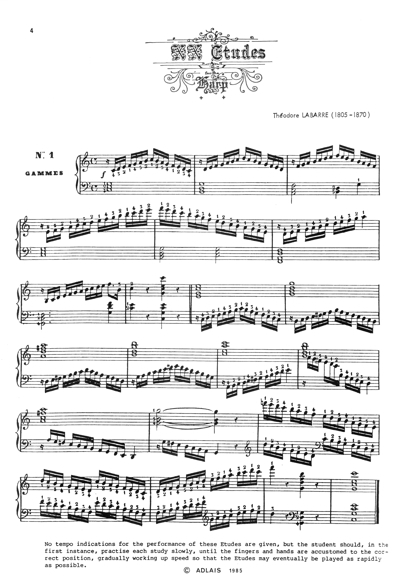 |
|||
| |
of Harp Music |
| © 2004-2025 ADLAIS |
| XX
Etudes Théodore Labarre (1805 - 1870) |
return to previous page |
 |
Work: | 20 studies for solo harp |
| Catalogue No: | Adlais 002 | |
| ISMN: | not issued | |
| Edition: | 1985, 252 x 355mm stapled | |
| Suitable for: | Grade 2-8 pedal harp | |
| Price:: | £10.00 Go to shop | |
| Examination: | Étude No. 1 - LCM Grade 4 List A (2014-2016) Étude No. 2 - LCM Grade 5 List A (2014-2016) Étude No. 9 - LCM Grade 6 List A (2014-2016) Étude No. 20 - LCM Grade 7 List A (2014-2016) Étude No. 14 - LCM Grade 8 List A (2014-2016) |
|
| Also available as Adlais 080 - French text edition | ||
Born in Paris in 1805, Théodore Labarre came of the aristocratic family of du Berry, and he was a foster-brother of Napoleon III. He studied the harp with Bochsa, Cousineau and Naderman, harmony with Dourlens, counterpoint with Eler and Fétis and composition with Boieldieu. in 1823 he won second proze in the Prix de Rome for his cantata 'Pyramus and Thisbé' and subsequently embarked on concert tours of England, Italy & Switzerland. In England he became an influential teacher, numbering amongst his students the brilliant harp virtuoso Elias Parish Alvars, who benefited greatly from the tchnical innovations Labarre developed for Erard's new double-action harp. Labarre returned to France in 1831, writing operas, ballets and incidental music as well as music for solo harp. The 'Méthode Complète de Harpe' (Op. 118) from which these XX Etudes are taken was published in 1844. |

